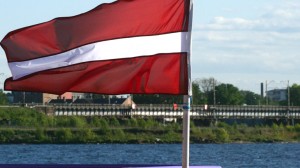It has been a year since Latvia has embarked on a path to overcome the economic calamities that it encountered in 2008.
When I participated in the World Economic Forum in Davos in January 2009 Latvia was in the spotlight starting a controversial economic recovery program. There were many skeptics that came up with a number of reasons why the program would fail.
Year 2010 will prove those skeptics wrong, because the program is clearly based on commitment to the necessary economic reforms, reliability of Latvia as an investment destination and resilience of the Latvian economy and people.
Therefore, Latvia is confident it will carry out the program and satisfy the Maastricht criteria for euro adoption in 2014.
Over the past year we have taken the difficult measures needed to stabilize the Latvian economy, including in public finances, and laid the foundations for its recovery. In 2009 painful, but necessary reforms — in public administration, health care, and education—were carried out in Latvia.
As a result the budget deficit in 2009 was below 10 percent of gross domestic product and further consolidation measures are to be taken in 2010. These reforms are not only a part of the measures in budgetary adjustment, but they also provide for a more effective system of distribution of public goods in the years to come.
The tax system has been made more sustainable and fair. The personal income tax base has been broadened and a real estate tax on residential property introduced. At the same time the corporate income tax remains among the lowest in the European Union with effective rates below 10 percent.
Already now we can appreciate what a great role the process of putting the state finances in order and adopting this year’s budget has played in stabilizing the economy. Uncertainty in the financial markets has diminished substantially: the lats’ interest rates for three months have fallen from 30 percent in June of 2009 to 4.6 percent in mid-January this year.
Looking at the current data I am sure that Latvia will show positive quarter-on-quarter GDP growth in the second half of 2010. This growth will not be based on credit-driven domestic demand, but on exports that will become the main engine for economic growth generation in the next few years.
This will be made possible by increased competitiveness of Latvian businesses. For example, in the manufacturing industry, which makes up a substantial part of our exports, in the first nine months of 2009 the export unit cost has shrunk by 15 percent. That is not only because of decrease in labor costs, but also due to increased productivity, thus providing solid foundations for export-oriented growth.
The current account has turned in a surplus for three consecutive quarters, reaching 10.1 percent of GDP in the third quarter of 2009. That, among other things, means that Latvia no longer has to borrow in order to cover its import expenses: these expenses can be covered by income from exports.
While total export levels are still down compared to 2008, there is strong month-on-month growth in the leading export industries, e.g. the wood industry showing over 50 percent growth since the beginning of 2009.
Some industries have even penetrated into new markets where Latvia’s potential had not been fully utilized, such as the Southern Caucasus and Central Asia.
Latvia has not wasted opportunities provided by the crisis, but used them to become a more business-friendly, export-oriented, and competitive economy.
I am proud that my country has been able to withstand the sizable adjustment and to learn from it, apply corrective measures to its economy and move on.
Latvia has demonstrated that with rigorous self-discipline it is not only possible to overcome the crisis, but also take advantage of it to lay foundations to a thriving economy. It has been a tough ride, but lessons have been learned and applied for future benefits.
Valdis Zatlers is the president of the Republic of Latvia. Learn more about his administration here.
Disclaimer:
Views expressed in the opinion section are never those of the Baltic Reports company or the website’s editorial team as a whole, but merely those of the individual writer.















Why is President Zatlers talking about what can only be called Latvia Inc.? What about the Republic of Latvia? What about the place where jobs are still being lost? What about the place where new and discouraging revelations about govt malfeasance are made seemingly daily? What about the place where the scythe has replaced thoughtful reform?
Where are the people here? Why hasn’t Latvia taken advantage of the crisis, not to become some bizarre corporate friendly lap-dog but to, finally, decide who it is, what it wants and create ways to provide real education, social welfare, health care and come to a human friendly environment?
Instead we have this very clear statement of the priorities of the govt of Latvia – “Latvia has not wasted opportunities provided by the crisis, but used them to become a more business-friendly, export-oriented, and competitive economy.”
The main engine of the growth will be export (mainly wood)- how much wood there still is in Latvia to export?
And, as Tom said, how about the negative sides of the recovery programme- 17% registered unemployment rate and increasing emigration of young people?
It was interesting to read that. What actually works here? Maybe IMF officers have enjoyed of staying Riga like kings, at least it looks like that even they are just officers but nothing special! This really works….is more or less like political diipa-daapa. Coming back down to earth and living along with ordinary Latvians the situation certainly doesn´t look so bright and sunny. Of course here in Latvia it´s not so nice to talk about crisis or some real existing problems. We are just so good and everything works of course. To be honest there are a lot of political desicions and in theory everything looks to work but actually almost nothing has changed to positive direction. Maybe and hopefully it starts to happen sooner than later. Rich ones and politicians are not suffering here. If the one has money this is a huge possibility to get richer and so on.
How about students, workers, old ones….How about education, medical health, social secure. All of them are suffering because of cutting this and that. Maybe some indicators on paper are positive, but reality bites and it hurts.
I respect the President of Latvia, I really do. First I thought who is that and the procedure how he was found was strange, but he has done a great work and kicking little bit our lazy selfish politicians to act. I like that, and hope four more years to him as a President. But still it is too early to celebrate of recovery of this economics here.